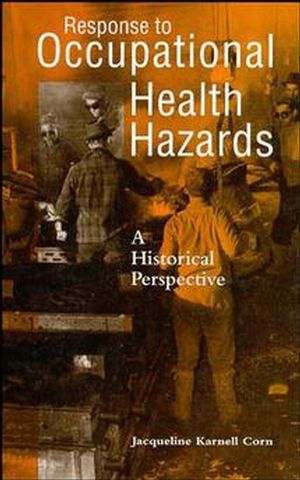Response to Occupational Health Hazards: A Historical PerspectiveISBN: 978-0-471-28407-9
Hardcover
200 pages
August 1992
 This is a Print-on-Demand title. It will be printed specifically to fill your order. Please allow an additional 10-15 days delivery time. The book is not returnable.
|
||||||
What are the effects of industry upon the health of employees? This
enormously complex question involves historical, social, political,
and scientific issues--and has a major impact on national policy
decisions and regulatory activities. This unique book explores the
history of occupational disease in the American workplace.
Beginning with the centuries-old belief of disease as an acceptable
and unavoidable by-product of industrial expansion, it moves to
current methods of diagnosis, control and prevention. You will find
in-depth coverage of:
* the growth of federal responsibility for occupational risks
* the evolution of mandatory health standards
* risk assessment and federal policy 1970-1990
* case studies of lead, asbestos, vinyl chloride, silicosis and byssinosis and steps taken to control or eliminate these conditions
Although the exact numbers are disputed, the Office of Technology Assessment today estimates about 6,000 deaths annually due to workplace injuries and about 100,000 deaths due to occupational illness. This book is vital for all physicians, industrial hygienists, safety professionals, nurses, lawyers, government policy makers, and others who are continually working to reduce these figures. It points the way to better methods of detection and control.innovative diagnostic techniques.improved epidemiological methodology.and a full understanding of government, labor and management's responsibilities to the health of their workers.
* the growth of federal responsibility for occupational risks
* the evolution of mandatory health standards
* risk assessment and federal policy 1970-1990
* case studies of lead, asbestos, vinyl chloride, silicosis and byssinosis and steps taken to control or eliminate these conditions
Although the exact numbers are disputed, the Office of Technology Assessment today estimates about 6,000 deaths annually due to workplace injuries and about 100,000 deaths due to occupational illness. This book is vital for all physicians, industrial hygienists, safety professionals, nurses, lawyers, government policy makers, and others who are continually working to reduce these figures. It points the way to better methods of detection and control.innovative diagnostic techniques.improved epidemiological methodology.and a full understanding of government, labor and management's responsibilities to the health of their workers.



